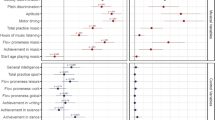Abstract
Theories of skilled performance that emphasize training history, such as K. Anders Ericsson and colleagues’ deliberate-practice theory, have received a great deal of recent attention in both the scientific literature and the popular press. Twin studies, however, have demonstrated evidence for moderate-to-strong genetic influences on skilled performance. Focusing on musical accomplishment in a sample of over 800 pairs of twins, we found evidence for gene–environment correlation, in the form of a genetic effect on music practice. However, only about one quarter of the genetic effect on music accomplishment was explained by this genetic effect on music practice, suggesting that genetically influenced factors other than practice contribute to individual differences in music accomplishment. We also found evidence for gene–environment interaction, such that genetic effects on music accomplishment were most pronounced among those engaging in music practice, suggesting that genetic potentials for skilled performance are most fully expressed and fostered by practice.



Similar content being viewed by others
References
Briley, D. A., & Tucker-Drob, E. M. (2013). Explaining the increasing heritability of cognitive ability across development: A meta-analysis of longitudinal twin and adoption studies. Psychological Science, 24, 1704–1713.
Bronfenbrenner, U., & Ceci, S. J. (1994). Nature–nuture reconceptualized in developmental perspective: A bioecological model. Psychological Review, 101, 568–586. doi:10.1037/0033-295X.101.4.568
Coon, H., & Carey, G. (1989). Genetic and environmental determinants of musical ability in twins. Behavior Genetics, 19, 183–193.
de Garay, A. L., Levine, L., & Carter, J. E. L. (1974). Genetic and anthropological studies of Olympic athletes. New York, NY: Academic Press.
Ericsson, K. A. (Ed.). (2006). The Cambridge handbook of expertise and expert performance. Cambridge, UK: Cambridge University Press.
Ericsson, K. A. (2007). Deliberate practice and the modifiability of body and mind: Toward a science of the structure and acquisition of expert and elite performance. International Journal of Sport Psychology, 38, 4–34.
Ericsson, K. A. (2014). Why expert performance is special and cannot be extrapolated from studies of performance in the general population: A response to criticisms. Intelligence, 45, 81–103. doi:10.1016/j.intell.2013.12.001
Ericsson, K. A., Krampe, R. T., & Tesch-Römer, C. (1993). The role of deliberate practice in the acquisition of expert performance. Psychological Review, 100, 363–406. doi:10.1037/0033-295X.100.3.363
Galton, F. (1869). Hereditary genius. New York, NY: Macmillan & Co.
Gobet, F., & Campitelli, G. (2007). The role of domain-specific practice, handedness, and starting age in chess. Developmental Psychology, 43, 159–172. doi:10.1037/0012-1649.43.1.159
Hambrick, D. Z., Oswald, F. L., Altmann, E. M., Meinz, E. J., Gobet, F., & Campitelli, G. (2014). Deliberate practice: Is that all it takes to become an expert? Intelligence, 45, 34–45. doi:10.1016/j.intell.2013.04.001
Loehlin, J. C., & Nichols, R. C. (1976). Heredity, environment, and personality: A study of 850 sets of twins.
Macnamara, B. N., Hambrick, D. Z., & Oswald, F. L. (2014). Deliberate practice and performance in music, games, sports, education, and professions: A meta-analysis. Psychological Science.
Muthén, L. K., & Muthén, B. O. (1998–2012). Mplus user’s guide (7th ed.). Los Angeles, CA: Muthén & Muthén.
Nichols, R. C., & Bilbro, W. C. (1966). The diagnosis of twin zygosity. Acta Genetica et Statistica Medica, 16, 265–275.
Plomin, R., DeFries, J. C., & Loehlin, J. C. (1977). Genotype–environment interaction and correlation in the analysis of human behavior. Psychological Bulletin, 84, 309–322. doi:10.1037/0033-2909.84.2.309
Prescott, C. A. (2004). Using the Mplus computer program to estimate models for continuous and categorical data from twins. Behavior Genetics, 34, 17–40.
Rutter, M. (2007). Gene–environment interdependence. Developmental Science, 10, 12–18.
Schneider, W., Bös, K., & Rieder, H. (1993). Leistungsprognose bei jugendlichen Spitzensportlern [Performance prediction in young top athletes]. Aufmerksamkeit und energetisierung. Facetten von Konzentration und Leistung, 277–299.
Tucker-Drob, E. M., Briley, D. A., & Harden, K. P. (2013). Genetic and environmental influences on cognition across development and context. Current Directions in Psychological Science, 22, 349–355.
Vinkhuyzen, A. A., Van der Sluis, S., Posthuma, D., & Boomsma, D. I. (2009). The heritability of aptitude and exceptional talent across different domains in adolescents and young adults. Behavior Genetics, 39, 380–392.
Watson, J. B. (1930). Behaviorism (Revised ed.). Chicago, IL: University of Chicago Press.
Author note
E.M.T.-D. and D.Z.H. jointly developed the study concept and drafted the paper. The data analysis was performed by E.M.T.-D. E.M.T.-D. was supported by National Institute of Child Health and Human Development (NICHD) Grant No. R21-HD069772. The Population Research Center at the University of Texas at Austin is supported by NICHD Grant No. R24-HD042849.
Author information
Authors and Affiliations
Corresponding author
Appendix
Appendix
Rights and permissions
About this article
Cite this article
Hambrick, D.Z., Tucker-Drob, E.M. The genetics of music accomplishment: Evidence for gene–environment correlation and interaction. Psychon Bull Rev 22, 112–120 (2015). https://doi.org/10.3758/s13423-014-0671-9
Published:
Issue Date:
DOI: https://doi.org/10.3758/s13423-014-0671-9




